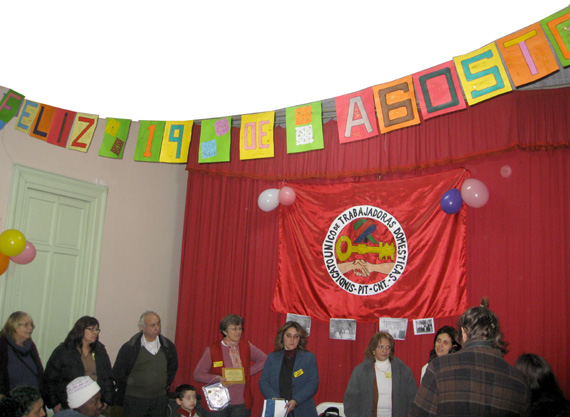|
In November 2006, Uruguay’s legislative
power passed a law (18,065) that
regulates paid domestic work,
representing a hard-earned gain for the
more than 100,000 men and women who work
as domestics in the country. However, it
was not until August 19, 2008 that they
were able to exercise their collective
bargaining rights, as Wage Councils*
were convened for the first time. Ninety
percent of all domestic workers are
women and 50 percent are still not
registered in the social security system.
Sirel
spoke with Cristina Otero,
organization secretary of the Uruguay’s Sole
Union of Domestic Workers (SUTD), who
spoke about the progress achieved in labor
organization and the importance it has for
the sector’s workers.
-What does this day mean for domestic
workers?
-Today, August 19, is the very first time
that Uruguay celebrates National
Domestic Workers’ Day, and I would say it is
a historical day, and that’s how we are
living it. It is a hugely important gain
because more important than the fact that
it’s a non-workable paid holiday for us is
the fact that it gives us a visibility we
never had before.
-When was your trade union formed?
-In 1985, but it lacked continuity and did
not have much weight until the year 2005,
which was when Uruguay’s confederation of
trade unions, PIT-CNT, called for a
reconstruction of the domestic workers’
union. So we began organizing ourselves with
several goals in mind.
-How many members does the union have now?
-There are more than 600 of us in the union,
that’s in Montevideo, the capital. In the
rest of the country, the situation is more
complex. It’s hard for these workers to
organize themselves in a union for several
reasons: social and economic conditions are
different outside Montevideo, the cities and
towns are so small that you have the sort of
situation where “everyone knows everyone
else”… In spite of that, we don’t think it’s
impossible for them to organize. We’ve
traveled to different places outside
Montevideo to discuss this with our fellow
workers and to raise awareness on the rights
of domestic workers. There’s a lot of work
to be done, but it’s a good start.
-How did things develop from the moment your
union was re-founded in 2005 to the time
when the Wage Councils were convened?
-The union’s first concern is that wages be
respected. For domestic workers wage
increases were set based on decrees, instead
of through collective bargaining like in
other branches of activity. So we started
knocking on doors in search of a solution.
We knocked on doors from 2005, when the Wage
Councils were reinstated, to 2008 -when we
secured the commitment of then Minister of
Labor Eduardo Bonomi to find a
counterpart that would negotiate with our
union.
This situation occurred because in an
initial stage the Chamber of Commerce was
asked to act as the negotiating counterpart,
but it refused to accept, arguing that it is
not representative of the domestic work
sector. Then, in 2008 the League of
Housewives assumed the role of counterpart
and we were able to negotiate in the
tripartite council scheme.
-What have been your most notable
achievements since then?
-The first achievement I want to highlight
is the creation of Group 21 (domestic work
sector) in the Wage Councils, because as of
then through collective bargaining we were
able to improve our wages, working
conditions, address seniority issues and all
our other rights as workers. Now we are
discussing union privileges and the sector’s
categorization, both of which are very
important issues to move forward in terms of
equal labor rights.
-What are SUTD’s short-term goals?
-Having
our own union headquarters. So far we’ve
been meeting in spaces loaned to us by other
unions, and we’re really grateful to them
for that, but it’s essential that we have
our own physical space, among other things
because there’s a significant number of
workers from outside the capital who are
working in Montevideo and who have nowhere
to go when they get sick or need to have
surgery. So they’re often forced to go back
to work before they’re fully recovered for
lack of a place to stay, and so they don’t
rest as much as they need to. Having our own
space would enable us to take these workers
in.
Another goal we have is to increase our
membership, both in Montevideo and in the
rest of the country, and improve wages,
which are still low for the number of ours
we work (the minimum wage for a domestic
worker is 4,600 pesos, or around 200
dollars).
-What message would you like to send
domestic workers in other parts of Latin
America?
-I would tell them that organizing is very
important to improve their working
conditions in general. Achieving unity in
the working class is a key factor if we want
to protect our rights.
 |